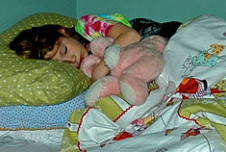For the first few years of college, I maintained the typical college-student sleep schedule: in bed at 2 a.m., up at 9 a.m. for my 9:30 a.m. lecture… which I inevitably slept through.
Sleep was boring; I preferred to spend time with my new friends and boyfriend. Many of those nights made for wonderful memories, but other times I’d find myself inexplicably upset over some small issue and picking fights with my boyfriend—now husband—in the wee hours of the night.

“You’re tired, go to bed,” he would tell me.
“No, I’m not!” I’d argue. “This is a real issue!” Why didn’t he get what I was feeling?
Now I’m older and wiser, and I have a Ph.D. in psychology. I’ve been conducting research into why sleeplessness fuels conflict in couples, and I am now ready to publicly state that my husband was right. Our research shows that a bad night of sleep is associated with more frequent, more severe, and less resolved conflict in couples.
If you’re like my husband, you won’t be surprised to hear that feeling tired is linked to more conflict—but you might be surprised that having a tired partner makes you more likely to pick a fight. And if you’re like me when I was an undergraduate? Then you may find yourself spoiling for a fight when, in fact, you probably should get some rest. Here are three reasons why couples should consider sleeping before they start disagreeing.
1. Sleepless people are more likely to bicker
We had participants complete a daily survey for two weeks. Each morning when they woke up they recorded how well and for how long they’d slept the previous night. Each night before going to bed they told us whether, and how much, they had fought with their partner that day.
The depressingly predictable result? The worse people slept the night before, the more they reported fighting with their partner that day.
But is it really that people fight more after a bad night of sleep? Perhaps these people were stressed, anxious, depressed, or unhappy in their relationships—and thus not sleeping well and fighting with their partner. We tested for this and found that the association between sleep and conflict wasn’t due to any of those factors.
We also wondered what happens if couples disturb each other in the night. Do they wake up cranky and get mad at their partner for that, creating a situation ripe for conflict? We tested this too, and found that participants did report that their partner disturbed their sleep. But it was the lack of sleep—not the fact that their partner caused it—that was associated with greater conflict the following day.
2. After sleeping poorly, conflict is more severe
For a second study, we had couples come into our laboratory and spend five minutes talking with each other about a problem in their relationship.
How did sleep influence this conversation? People who reported sleeping poorly the previous night experienced fewer positive emotions and more negative emotions, and were less able to take their partner’s perspective during the conversation—both of which, needless to say, can hurt the well-being and longevity of the relationship.
We also looked at whether people were affected by their partner’s sleep. It turns out that if your partner doesn’t sleep well, you also experience fewer positive emotions and more negative emotions, and you are less able to take their perspective in a disagreement—even if you slept well.
So if either partner doesn’t get a good night’s sleep, both partners are affected and their fights get worse.
3. Sleepy couples are less able to resolve conflict
After their five-minute conversation was over, we had each partner in the couple tell us how well they’d resolved the problem they’d just discussed—in other words, if they came to an agreement or compromise of some sort. Participants were most likely to report resolving the conflict when both partners were well-rested. If either partner had slept poorly the previous night, the fight was less likely to be resolved.
Once again, when it comes to conflict resolution we found that it takes two—just one poorly rested partner is enough to trigger and worsen a conflict.
What does this mean for you? If you find yourself more irritable than usual, think about whether you or your partner had a bad night of sleep.
We don’t know yet whether these findings are causal, but the correlations are worth considering if you feel like picking a fight in the middle of the night. People who are sleep deprived tend to experience more negative emotions, are more reactive to negative events, and are worse at solving problems. Someone who is sleep-deprived can be a ticking time bomb, reacting automatically without the capacity to stop and think it through.
The bottom line? If one of you feels tired, put the problem aside until morning. You just might wake up to find the trouble has gone away.








Comments